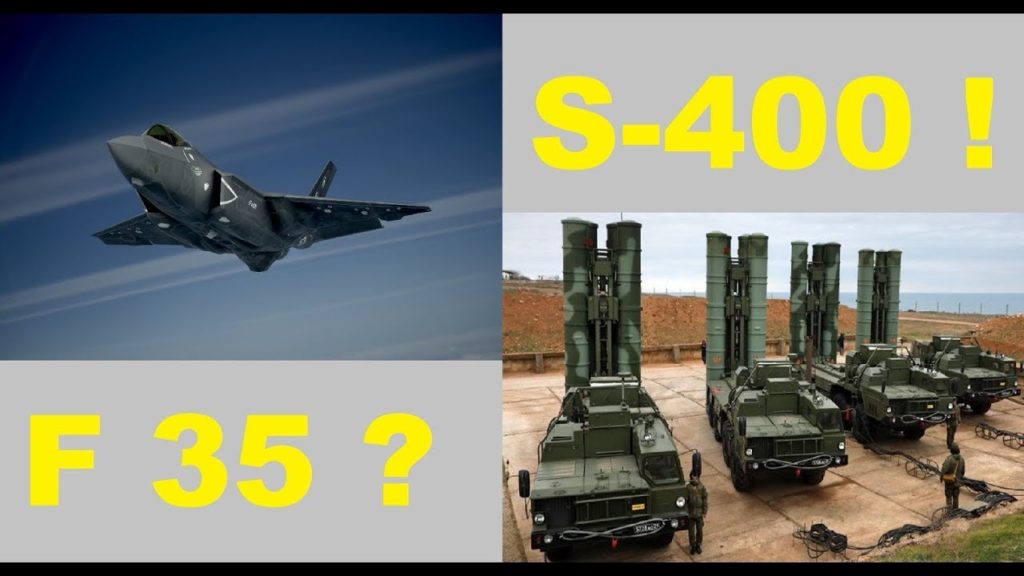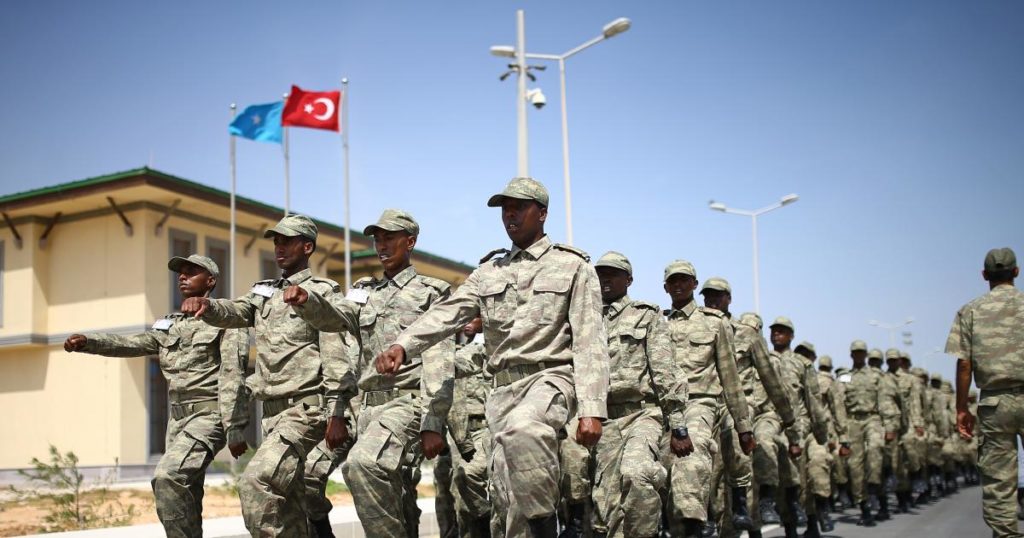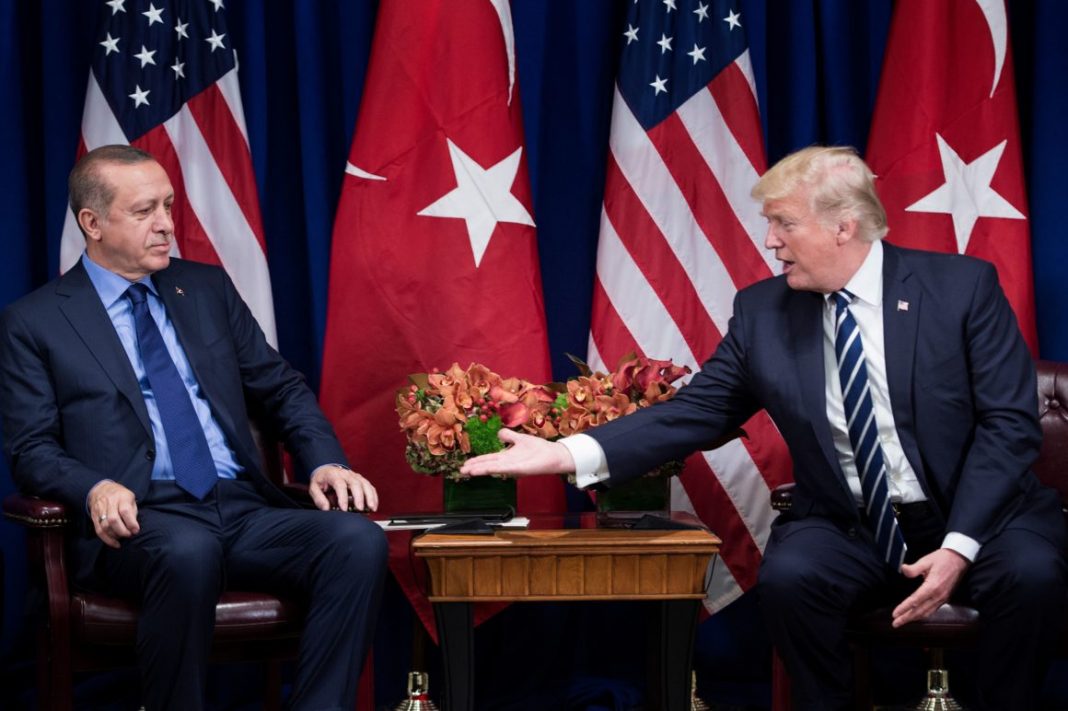Hakan Gunes.
Ankara insists buying S-400 Russian air defense system despite Washington’s sanction threats, which includes the threat of cancellation of F-35 sales to Turkey. This arms trade dispute might be the tip of the iceberg: After a firm cooperation period in early and mid 2000’s, disputes became much more frequent and numerous in the second half of AKP’s 17 years long rule. Incentives of the dispute, however, lies in the changing international relations environment both on a global and regional level. Turkey’s transformation from a “trading state” into a “coercive regional power” and shifting alignments in the Middle East constitute leading parameters of this new intra-alliance tension.
Since the end of World War 2 Turkey has been one of the key allies of the USA in multiple regions surrounding the country. Over the past 70 years, US-Turkish military and political alliance played crucial roles for the implementation of Western policies in the Balkans, Black Sea, Eastern Mediterranean and Middle East regions. In the Post-Cold War era, Turkey’s new openings in areas such as North Africa, Caucasus and Central Asia always steered by a Western umbrella. Mainly because of the intra-alliance disagreements on Cyprus issue in 1964 and 1974, Turkish-US relations experienced some breaks. Nonetheless, both sides concealed these disputes and continued their strategic partnership. Similar to her predecessor governments, Ankara’s present ruling party AKP (Justice and Development Party of Erdogan) was perfectly following the classical Turkish policies both with regard to international financial policies and military-political interests of the US imperialism.
However, after a close cooperation in early and mid 2000’s, disputes and disagreements became much more frequent in the second half of AKP’s 17 years long government. Turkish-Russian agreements is the most recent dispute challenging the traditional US-Turkish military-political relations: Ankara gave nuclear power plant contracts to Russian companies, Turkish military will buy and deploy Russian S-400 air missile defense system, several gas, oil nuclear and trade agreements signed between Ankara and Moscow. Moreover, beyond Russia, Ankara’s relations getting warmer and tighter with countries such as Iran and Venezuela while weakening with NATO/Western allies.
What do all these developments mean in a larger scale? Does Erdogan regime really challenge the US/Western hegemony and becoming a friend of counter-hegemonic camp?
The answer is an unambiguous no. Changes in Ankara’s stance are important and relatively different than former Turkish governments. However, not only the character of the new Turkish foreign policy standpoint but also its economic, military and political aims do not reflect an anti-hegemonic stance. It is rather a new proposal to serve the US led Western hegemony system with a new understanding and within a new paradigm.

Bargaining with the USA signifies a challenge, not a shift of axis:
First of all, one must notice that the Post Cold War World Order in late 2010s is both hierarchical and multi-centric at the same time. Fragmentation of alliances and disintermediationof actors is not an anomaly compared to bi-polar era. Therefore, most of the above mentioned disputes are new but not unique to Turkey. Rather they are the symptoms of an emerging new world order, the new international system: Close allies of US such as Philippines, Egypt and Pakistan also experiencing similar disputes with Washington. More and more middle (regional) power allies of the US asking for more autonomy and looking for new deals that could improve their bargaining power with their bloc leaders. Thus, all the “anti-US” rhetoric of the authoritarian leaders, including Erdogan, are about the power relations and bargaining processes with Washington and are quite instrumental.
More importantly, the bargaining is not for more political freedom for its people, or for more economic autonomy from international financial institutions. Rather Erdogan, Sisi or Duterte, all like to improve their regional and domestic power in order to implement more authoritarian policies. These populist “anti-imperialist”-like rhetoric usually includes an anti-Semitist, an old style anti-communist stance and encouraging oppression of women rights, social rights and the rights of ethnic minorities.
Regional Complex: Saudi-Egyptian versus Iranian versus Turkish-Qatari Alliances
US is not as capable as before in organizing the regional power balances as it has been in the cold war and early post-cold war periods: Wasington was the main balance holder in Saudi-Iran, Saudi-İran-Turkey Versus Egypt-Libya-Iraq relations, Turkey-Greece relations and so on. With the changing international environment and relative decline of US power by 2000s, US lost its regulatory role, at least relatively. Zigzags of Obama period replaced by Donald Trump’s emerging Middle East policy alignment. Trump prioritizes Israel’s interests and concerns in the region and aims at pivoting Saudi-Egyptian-Emirates alliance against Iran. This preference already created serious tensions between Ankara and Riyadh.
Recent US decision to designate “Muslim Brotherhood” as a terrorist organization, the murder of journalist Jamal Kashoughi in Saudi’s Istanbul Consulate and arrests of two Emirati spies in Turkey last month are all symptoms deteriorating Ankara’s relation with the US backed Riyadh. Once cooperating partners, the Saudi’s Riyad and Erdogan’s Ankara now became rivals in Libya, Syria and even enemies in Qatari-Saudi crisis.
Briefly, the US’s Middle East priorities and preferences are puzzling US-Turkish relations. On the other hand, Turkey’s regional ambitions are not just Erdogan’s rhetoric for domestic politics. Beyond domestic instrumental value of propagating Turkey as regional and even global power, Ankara aims at keeping its geopolitical gains in the the Middle East. Ankara is highly aware of its need to keep Western economic and military support to sustain its gains in the region. A closer look at the expansion of Turkish military capacity and its military-geopolitical openings in the greater Middle East might shed light on the difficulties of reconciliation of Turkish “interests” and the interests of US favored allies. And finally, rising armament in the region, and Trump’s aggressive arms trade policy complicates the process twice.

Turkish Military Expansion in the Region
Turkey hosts one of the biggest US airbases in its southern city of Adana/Incirlik. As an emerging regional actor, Turkey is becoming one of the fastest growing military power and increasing its military capacity both by taking part in US/NATO led military operations and by having new military bases for itself: The Turkish Military ranks between 7th to 11th “greatest” military power worldwide according to Global Firepower Index in the last 10 years. Ankara has been taking part almost in all US or NATO led military operations over the last 25 years: IFOR AND SFOR in Bosnia-Herzegovina; KFOR in Kosovo; ISAF in Afghanistan; NATO Baltic Air Policing Operation in Baltics; Naval Ocean Shield Operation in the Horn Of Africa and Libya Operation during the fall of Qaddafi in Libya. In addition to its loyal member role in NATO, Turkey also became one of those most militarized international states with more than few overseas military bases abroad. A brief list of Turkish military presence abroad could shed light on the character of Turkish political and military interest.
-Azerbaijan: Buildings and Structures In Gizil Sherg Military Town, and One Terminal Building Located in the Airfield in Haji Zeynalabdin Tagiyev Settlement.
-Northern Cyprus (Disputed by Republic Of Cyprus): Cyprus Turkish Peace Force Command
-Iraq: A base with 2000 personnel.
-Qatar: A base with 3000 personnel.
-Somalia: A base in Mogadishu with 200 personnel (could increase to over 1000).
-Syria: Bases in Al-Bab, Al-Rai, Akhtarin and Jarablus with unknown number of personnel. New bases were followed at Atme and Darat Izza.
While designing itself as a regional military and economic power (one might call it sub-imperialism or regional imperialism) Erdogan’s regime is trying to bargain with the US to get greater support for two main concerns of the AKP government: The first concern is to get full support of the US/Western powers on the Kurdish issue both on domestic and regional levels. More specifically, Ankara asks to its allies to not support any entity affiliated with the Kurdistan Workers Part (PKK), which is the top security threat according to Turkish establishment over the last 35 years. Secondly, Erdogan’s regime demands more direct cooperation and support for her neo-Ottomanist expansion policies especially in the Muslim populated regions. These are the two main sources of tension between Ankara and Washington.
Finally, it must be noted that beyond Erdogan’s rhetorical anti-US hegemony claims, his government provides a heaven for the neo-liberal western establishment. Having perfect trade and investment agreements with its Western allies, Turkish ruling party tries to offer a plan for resolving disputes: In return for a greater support for Ankara’s Kurdish policy and Turkish regional expansion, Erdogan offers to keep country as a hub both for NATO/US military operations and for the neoliberal capitalism. This policy means more military spending, more interference of the internal affairs of the neighboring states, more regional conflict and war; poverty and death for the Turkey’s working class and oppressed people.
Share the post « BEYOND F-35 VERSUS S-400 DISPUTE: INCENTIVES OF US-TURKISH TENSION »

